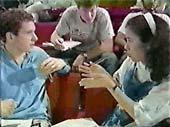Peer Instruction,
at
2015 Transformative Learning Conference, University of Central Oklahoma (Oklahoma City, OK),
Thursday, March 26, 2015:
Peer Instruction
Catalyzing learning using Learning Catalytics,
at
Data Analytics Seminar, University of Michigan (Ann Arbor, MI),
Friday, February 14, 2014:
Memorization or understanding: are we teaching the right thing?,
at
2012 International Consortium for Educational Development (ICED2012) (Bangkok, Thailand),
Monday, July 23, 2012:
Peer Instruction,
at
Program on Effective Learning and Teaching, Universidad Diego Portales, Harvard University (Cambridge, MA),
Wednesday, April 14, 2010:
Teaching Science: Transferring information or engaging the mind?,
at
Peer Instruction Workshop for Science and Math Teachers, Harvard University (Cambridge, MA),
Thursday, May 18, 2000
Qualitative versus quantitative reasoning: are we teaching the right thing?,
at
Physics Seminar, Rensselaer Polytechnic Institute (Troy, NY),
Wednesday, April 1, 1992
Confessions of a converted lecturer,
at
University of Texas at Arlington (Arlington, TX),
Friday, April 25, 2014:
Confessions of a converted lecturer,
at
Learning Forum, Case Western Reserve University (Cleveland, OH),
Friday, September 28, 2012:
Comprensión o Memorización: ¿Estamos haciendo lo correcto?,
at
Foro Nacional de la Calidad Educativa 2010 (Bogotá, Colombia),
Tuesday, July 27, 2010:
Interactive lectures: a simple method to keep students engaged,
at
Physics Teaching in Engineering Education Conference, Katholieke Universiteit Leuven (Leuven, Belgium),
Wednesday, June 5, 2002:
Understanding or Memorization: Are we Teaching the Right Thing?,
at
Gordon Conference on Innovations in College Chemistry Teaching (Oxnard, CA),
Saturday, January 1, 1994
Interactive Learning: Technology in the Classroom,
at
Symposium on Education and Technology (Cambridge, MA),
Monday, June 16, 2014:
Educating the Innovators of the 21st Century,
at
LASPAU/Brasil Seminar, Harvard University (Cambridge, MA),
Thursday, November 15, 2012:
Confessions of a converted lecturer,
at
Academic Transformation Speaker Series, University of Texas at Austin (Austin, TX),
Friday, November 12, 2010:
Understanding or Memorization: Are we teaching the right thing?,
at
2003 Speaker Series on Teaching, Learning, and Technology, University of Southern California (Los Angeles, CA),
Tuesday, October 7, 2003
 Peer Instruction actively engages the students in their own learning. Carefully chosen questions (ConcepTests give students the opportunity to discover and correct their misunderstandings of the material, and, in the process, learn the key ideas of physics from one another.
Peer Instruction actively engages the students in their own learning. Carefully chosen questions (ConcepTests give students the opportunity to discover and correct their misunderstandings of the material, and, in the process, learn the key ideas of physics from one another.